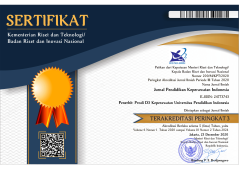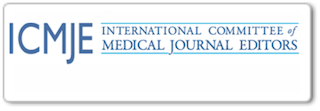PENGALAMAN PSIKOLOGIS PASIEN INFARK MIOKARD AKUT SELAMA DIRAWAT DI RUANG INTENSIF
Abstract
Infark Miokard merupakan salah satu penyakit terminal yang memerlukan perawatan intensif. Perawataan intensif yang diperlukan harus holistik, mencakup bio psiko sosial dan spiritual. Psikologis infark miokard harus selalu diperhatikan, karena salah satu penyebab infark miokard adalah dari psikologis atau dikenal dengan stress. Tujuan dari penelitian ini untuk mengetahui pengalaman pasien infark miokard akut yang menjalani perawatan di ruang intensif. Jenis penelitian adalah deskriptif kualitatif dengan pendekatan phenomenology yang dilakukan di salah satu rumah sakit di Bandung periode Juni-Juli 2013. Jumlah informan 10 orang pasien infrak miokard akut yang pada saat dilakukan wawancara sudah dalam perbaikan killip I dan II yang diambil secara purposive sampling, dirawat di ruang intensif dan kondisinya telah stabil. Pengumpulan data dilakukan dengan wawancara mendalam kemudian dianalisa menggunakan content analysis dari Hancoch. Hasil penelitian didapatkan 3 tema penelitan yaitu seluruh responden merasa tidak berdaya, 9 responden mengalami ketidakpastian menghadapi masa depan dan 10 responden menyatakan ketakutannya akan kematian. Seluruh pasien infrak miokard mengalami masalah psikologis, oleh karena itu hasil penelitian ini dapat menjadi rekomendasi dalam memberikan layanan kesehatan bagi pasien kondisi terminal; infark miokard akut yang sedang menjalani perawatan intensif. Penting kiranya untuk dapat mengelola dan mengintegrasikan pelayanan perawatan pada pasien infark miokard akut yang sedang dirawat di unit intensif secara holistik meliputi fisik psikologis sosial dan spiritual.
ABSTRACT
Communication is a very important process in human relationship. In providing nursing care, nurses should have a good knowledge and communication skill as the beginning of a good relationship between nurses, patients, and their families. Nurses with good communication skill had an easier opportunity to make a good relationship with the patient and their families. This study aimed to identify effective communication barriers among nurses in developing communication with patients’ family according to nurses’ perspective in Intensive Care Unit Rumah Sakit Umum Al Islam Bandung. This descriptive explorative study involved 10 nurses were taken with accidental sampling. Data were gathered using interview and observation. Data analyzed with the content analysis. Result showed that there were at least five topic of effective communication barriers among nurses in developing communication with patients’ family according to nurses’ perspective in Intensive Care Unit Rumah Sakit Umum Al Islam Bandung; role conflict, family demographic factors, misunderstanding, environment and situation in the ICU, and family psychological condition. So, training related to communication between nurses and patients’ family were necessary to undertake in order to improve the ability of nurses such as foreign language skills and patience in dealing with the situation in the ICU especially in relation to the patient's family. This is because nurses are the spearhead of health care service in hospital.
Keywords
Full Text:
PDFReferences
Ahmad, N., Kamal, M., Anwar, A.H.M.M., and Rahman, A.K.M.S. (2006). Needs Of Terminally Ill Patients And Their Families: An Experience With Fifty Three Patients Attending A Newly Organized Palliative Care Service In Bangladesh. Journal of BSA, Volume 19, No. 1 – 2 .
Adelbratt, S., & Strang, P. (2000). Death anxiety in brain tumour patients and their spouses. Palliative medicine , 499-507.
Albrecht, C. (2006). Overview of The South African Cancer Research Environment As A Basis For Discussions Concerning The Activation of CARISA ( Cancer Research Initiative of South Africa). Independent Medical Research Consultant
Caplan, & Sadock, B. (2005). Ilmu Kedokteran Jiwa Darurat. Jakarta: Widya Medika.
Clayton, J.M., Hancock, K., Parker, S., Butow, P.N., Walder, S.,
Carrick, S., et all. (2008). Sustaining hope when communicating with terminally ill patients and their families: a systematic review. Psycho-Oncology 17: 641–659
Gonen, Kaymak, & Cankurtaran. (2012). The factors contributing to death anxiety in cancer patients. J Psychosoconcol, 30: 347-358.
Glaser, G. (1972). Disclosure of Terminal Illness In: Patient, Phisician and Illness. Free Press New York.
Govender, M. (2008). Death Anxiety and Attitude of Nurses towards Dying. The Gerontological Society of America Vol 45.
Hamid, A.Y.S S. Hamid. (2000). Aspek Spiritual dalam Keperawatan. Widya Medika : Jakarta.
Hawari, D. (2004). Doa dan Dzikir Sebagai Pelengkap. PT. Dana Bhakti Prima Yasa : Jakarta
Hawari, D. (1996). Al-Quran: Ilmu Kedokteran Jiwa.dan Kesehatan Jiwa PT. Dana Bhakti Prima Yasa : Jakarta
Khawar, Aslam, & Amir. (2013). Perceived Social Support and Death Anxiety Among Patients with Chronic Diseases. Pakistan Journal of Medical Research, 75-80.
Lumenta, B. (1997). Tanatologi tentang Perilaku Pasien Terminal. Ebers Papirus-Vol 3. No.1
Lonetto, R., & Templer, D. ( 1991). Death Anxiety. Washington: Hemisphere Publishing Corporation.
Monks. (2011). Psikologi Perkembangan. Yogyakarta: Gadjah Mada University Pres.
Ross, K. E. (2011). Death and Dying. New York: Simon and Schuste.
Smeltzer & Bare (2007). Brunner & Suddarth’s texbook of medical surgical nursing. Philadelphia: Lippincott Williams & Wilkins.
Sugiyono. (2014). Metode Penelitian Kuantitatif dan kuantitatif. Bandung: Alfabeta.
Yuliana. (2015). Mengatasi Kecemasan terhadap Kematian pada Pasien Sakit melalui Konseling Kelompok. Seminar Psikologi & Kemanusiaan , 458-463.
DOI: https://doi.org/10.17509/jpki.v3i1.7477
Refbacks
- There are currently no refbacks.
Jurnal Pendidikan Keperawatan Indonesia(JPKI) published by Indonesia University of Education. JPKI is licensed under a Creative Commons Attribution-ShareAlike 4.0 International License.
Office :
Nursing Department. FPOK UPI.
229, Dr. Setiabudhi Street. Bandung 40154
West Java , Indonesia
E-mail : jpki@upi.edu

_.png)
_.png)
_.png)











